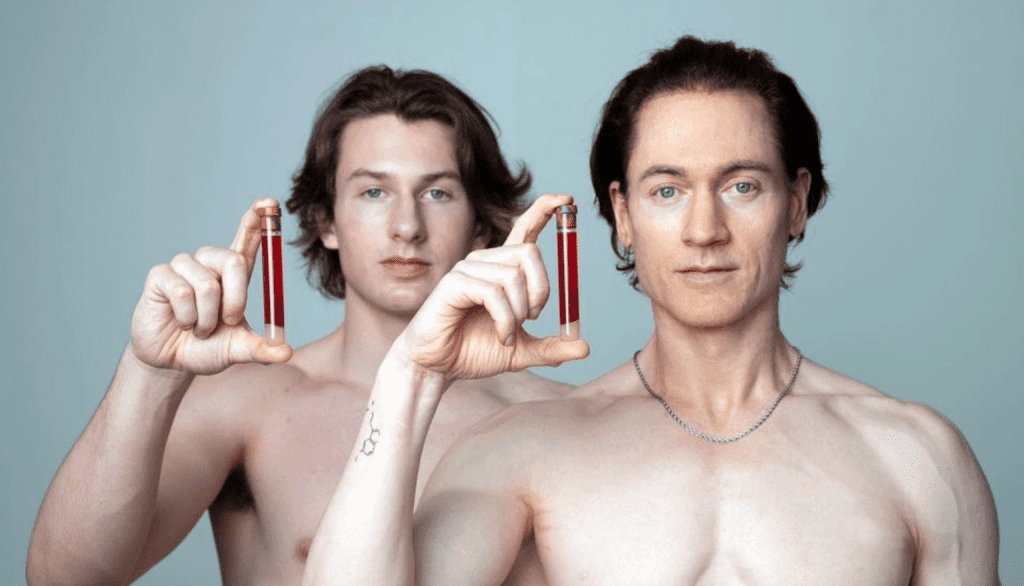In a world obsessed with youth and beauty, some are willing to go to extreme lengths to fight the effects of aging. Bryan Johnson, a 47-year-old multimillionaire and biohacker, is at the forefront of this pursuit. Spending an astonishing $2 million annually to recapture the vitality of his 18-year-old self, Johnson’s journey has captured global attention. While his commitment to anti-aging innovation is groundbreaking, his recent experience with a controversial procedure highlights the dangers of pushing the limits of science and vanity.
Who Is Bryan Johnson?

Bryan Johnson is no ordinary 47-year-old. A successful entrepreneur, he founded Braintree, a payment gateway that became an integral part of digital transactions, supporting platforms like PayPal, Apple Pay, and Venmo. After selling the company to PayPal for $800 million in 2013, Johnson walked away with a personal fortune of approximately $300 million.
But instead of settling into a life of luxury and retirement, Johnson made himself his life’s work. Launching Project Blueprint, he committed to reversing the aging process by investing in cutting-edge technology, rigorous health regimens, and experimental therapies. Dubbed “the world’s most measured human,” Johnson monitors every aspect of his biology in his quest to defy time.
The Rise of Project Blueprint
Project Blueprint is more than just a lifestyle; it’s a meticulous protocol aimed at optimizing Johnson’s physical and mental health. From strict diets and intense exercise routines to cutting-edge medical procedures, every decision is backed by data. Johnson claims his regimen has given him the body of an 18-year-old, boasting biomarkers that outperform many younger individuals.
However, his most recent endeavor, “Project Baby Face,” has sparked debate and concern. Focused on restoring youthful facial fat—a critical component of looking young—this particular experiment led to unforeseen and dramatic consequences.
Why Facial Fat Matters in Perceived Youth
Facial fat plays a crucial role in maintaining a youthful appearance. As people age, they naturally lose volume in their face, resulting in hollow cheeks, sagging skin, and more pronounced wrinkles. While Johnson’s biomarkers may indicate the health of a teenager, his face told a different story, prompting his team to tackle the issue head-on.
The solution? Injecting a fat-derived extracellular matrix to stimulate natural fat growth and restore facial volume. But with limited personal fat available, Johnson opted for donor fat—an ambitious decision that would later backfire.
The Shocking Side-Effect: A Severe Allergic Reaction
Shortly after undergoing the procedure, Johnson experienced an alarming allergic reaction. His face swelled to unrecognizable proportions, blurring his vision and causing widespread concern.
In a candid post shared on X (formerly Twitter), Johnson detailed the ordeal:
“Immediately following the injections, my face began to blow up. I was prepared for the worst during an upcoming interview with Bloomberg’s Ashlee Vance. I even asked if he was trained in life-saving techniques, just in case.”
The swelling lasted for seven nail-biting days, leaving Johnson physically unrecognizable and emotionally shaken. While his face eventually returned to normal, the incident underscored the risks of experimental procedures.
Public Reaction: Admiration or Alarm?
Johnson’s extreme anti-aging efforts have sparked mixed reactions. While some admire his dedication to pushing scientific boundaries, others question the ethics and practicality of such pursuits.
One commenter expressed disbelief, writing, “Did he really inject someone else’s fat into his face for cosmetic reasons?” Another took a humorous approach, stating, “Our mission statement is to do the complete opposite of this guy.”
Despite the backlash, Johnson remains undeterred. He and his team are already revising their strategy for “Project Baby Face,” determined to achieve their goals without repeating past mistakes.
The Cost of Becoming the Product
As Johnson himself admitted, “Building a product is one thing; being the product is a whole different thing.” His transformation from entrepreneur to human experiment highlights the psychological and physical toll of turning oneself into a living project.
The financial costs are equally staggering. Spending $2 million annually on anti-aging procedures, equipment, and specialists, Johnson’s commitment is unattainable for most. Yet, his journey raises important questions about the future of biohacking and the ethical boundaries of science.
What Can We Learn from Johnson’s Experience?
While Johnson’s efforts may seem extreme, they shed light on the potential and limitations of modern science in addressing the aging process. Here are some key takeaways:
- Science Has Limits: Even with vast resources, not all experiments yield desired results. Johnson’s allergic reaction serves as a cautionary tale for those seeking instant solutions to complex problems.
- Health Over Vanity: Prioritizing biomarkers and overall health is commendable, but focusing too heavily on appearance can lead to unnecessary risks.
- The Cost of Innovation: Johnson’s journey highlights the immense financial and personal investment required to pioneer anti-aging science.
The Future of Anti-Aging
As biohacking gains popularity, Johnson’s story underscores the importance of balancing ambition with caution. While advancements in science offer exciting possibilities for extending youth and vitality, they also come with risks that must be carefully managed.
Johnson’s determination to perfect his methods reflects humanity’s age-old desire to defy aging. Whether his efforts will yield lasting breakthroughs or serve as a cautionary tale remains to be seen.
Conclusion: A Journey of Ambition and Risk
Bryan Johnson’s quest to recapture his youth through Project Blueprint is both inspiring and cautionary. His willingness to push boundaries highlights the potential of biohacking to revolutionize health and aging. Yet, his recent ordeal with “Project Baby Face” serves as a stark reminder that even the most ambitious endeavors are not without risks.
In the end, Johnson’s journey invites us to reflect on our own relationship with aging. While science can enhance our lives in remarkable ways, the pursuit of perfection should never come at the cost of safety or well-being. For Johnson, the road to becoming 18 again is paved with lessons—ones that may ultimately shape the future of anti-aging science.



